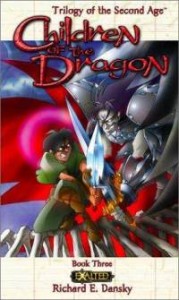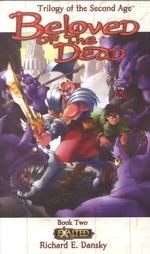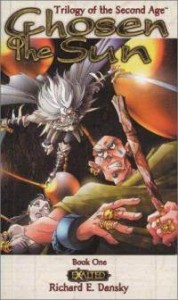

 Chosen of the Sun
Chosen of the Sun
Beloved of the Dead
Children of the Dragon
In the world of the Exalted, death is just the beginning.
After plundering an ancient tomb and leaving behind some decidedly unpleasant boobytraps, the wandering priest of the Immaculate Order known as Eliezer Wren makes a powerful, and determined, enemy in the form of the ancient Prince of Shadows, a man who commands the living and the dead alike. Elsewhere, a young man named Yushuv becomes the sole surviver of his village after the Prince’s servant, Ratcatcher, massacres everyone. But the catacombs under Yushuv’s village harbor an old secret, one that’s not as dead as everyone thought.
Before long, Wren and Yushuv are on the run, separately fleeing their enemies. For though the paths of these two unlikely heroes don’t cross, those of their enemies do. The Prince of Shadows, who will stop at nothing for revenge. Ratcatcher, a pawn of dead gods who cannot be stopped by death. Unforgiven Blossom, whose hatred of Ratcatcher leads her to betrayal after betrayal. The Wyld Hunt, a force of magically-imbued warriors who serve a common purpose. The Fair Folk, those unfathomable fey beings who haunt the dreams and nightmares of the mortal world. Bonecrack, a wolfen spirit who seeks to fulfill an unholy bargain against Yushuv. Abyssal beings and dead gods, whose purposes cannot be comprehended by the living.
It seems as though everyone wants Wren and Yushuv dead, save for a few allies of dubious reliability. At stake: their lives, and a pair of powerful relics that could change everything. All they have to do is survive, a quest which will take them all around the land and right back to the beginning, through the realms of life and death and the Labyrinth that underlies the mortal world. To complicate matters, each of the fugitives has been blessed and cursed by a being known as the Unconquered Sun, Exalting them, turning them into creatures of unimaginable power called Anathema. Even old allies will seek to kill them on sight, or use them for their own sinister purposes.
Collectively, these three books are known as the Trilogy of the Second Age, and take place in the setting of White Wolf’s Exalted gameline. Going into the trilogy ignorant of Exalted, I gleaned the following: normal people are suddenly imbued with the powers of ancient warrior demi-gods, able to accomplish a number of feats beyond the ken of mortal man. On the downside, lesser-powered beings known as the Dragon-Blooded turned upon these “Solar Exalted” centuries ago and destroyed them all … for a time. Now the old Exalted are coming back, and have to deal with a multitude of enemies and old grudges and rivalries. The Wyld Hunt seeks to destroy any such “Anathema” it locates, while the monks of the Immaculate Order play a deadly game with everyone. At least, that’s what I was able to gather from the fiction. Oh, and there’s lots of combat, reminiscent of Hong Kong cinema and anime.
If I sound a little down on this, it’s merely because I never could shake the feeling that this was based on a role-playing game, and as such, was purposefully made to show off “look what we can do!” in turns of powers and factions and plots. It’s as though everything but the kitchen sink was thrown in for good measure: Order, Guide, Exalted, Dragon-Blooded, Fair Folk, dead gods, Thousand Gods, Abyssal Beings, and so forth. As a result, things got a bit muddled in terms of who was playing for which faction at which time. Meanwhile, a little exposition earlier on would have gone a long way; it isn’t until 190 pages into the first book that we finally learn the story behind the Exalted and the Dragon-Blooded, and get some background into the matter. Honestly, if this had somehow been explained much earlier on, it would have saved me a lot of questions. Only those who are really familiar with the game setting wouldn’t have been at least partially lost. Those attracted by the bright manga-like cover art or the cover text and coming in blind, might feel a bit out of place. And for fiction based on an outside source (such as RPGs), a delicate balance really needs to be struck if you want to please old fans and new readers alike. Sadly, these books didn’t quite work in that regard.
Also — and I really am reluctant to say this — the books felt padded. There was a lot of running around, and a lot of characters doing things, and a lot of plotting and fiendish cackling and battle scenes, and in the end, it all felt like a lot of sound and fury signifying nothing. Even the characters seem to notice this at times, commenting on all the meandering they’ve done over the course of the storyline. There’s never a sense of actual purpose. Wren wants to survive. Yushuv wants to avenge himself and to survive. Everyone else wants to kill and/or eat those two, and steal the magical MacGuff — errr, the ancient dagger and sword that seem to be connected to the same Exalted that’s possessed/empowered/chosen Yushuv.
And so everyone wanders around the map, looking for everyone else, until they all finally converge in one great climatic clash. When it’s over … very little seems changed. And it’s not even as though I felt there was any great threat or purpose to the whole matter. It’s as though everyone decided they’d had enough, and wandered off-stage for a while, deciding to resume their conflicts later. Heck, even those who died in the process are by no means guaranteed to stay dead, as this series goes to lengths to prove. Add to all this some sloppy copy-editing in the third book, and my overall satisfaction was greatly diminished.
And believe me, this really is a shame. Richard Dansky is a good writer. He has the characterizations down pat, giving everyone a unique perspective and a complex set of motivations that could go a long way towards driving them. Even the spear-carriers have their personalities and get in some good lines. Dansky’s strength is clearly in the dialogue and character depths. I developed a sneaking fondness for Ratcatcher, who was by no means a nice or good person, and actually looked forward to the segments featuring him, just to see what else he’d get into. The Prince of Shadows was a little too melodramatically Evil, right down to the careless disposing of loyal henchlackeys whenever they displeased him, but he was entertaining. The characters made the story worth reading. Also, Dansky really has an eye for the combat scenes, making them both visual and visceral. For a game system that emphasizes cinematic-style combat, this is clearly an asset.
In the end, Chosen of the Sun, Beloved of the Dead, and Children of the Dragon serve as competent novels based on a gaming property, hampered by what seemed to be a need to extend a single book (or even a duology) into the magical number three, and the need to convey information about the game they’re inspired by. I’m firmly convinced that Dansky is an excellent writer, though, and that if he was given free rein he could do much better. If and when he ever produces an original novel, I’ll be first in line to read it. The Trilogy of the Second Age is his first solo series, so future attempts will undoubtedly be much improved.
Would I recommend this trilogy, though? I’m honestly torn. Yes … and no. It has its problems, and it has its strengths. If you’re familiar with the game Exalted, then by all means pick it up. If you like action-packed fantasy in the style of Crouching Tiger, Hidden Dragon, this evokes the same imagery and sense of atmosphere. But if you like things a bit more epic and world-shattering, or are impatient, this may not be for you.
